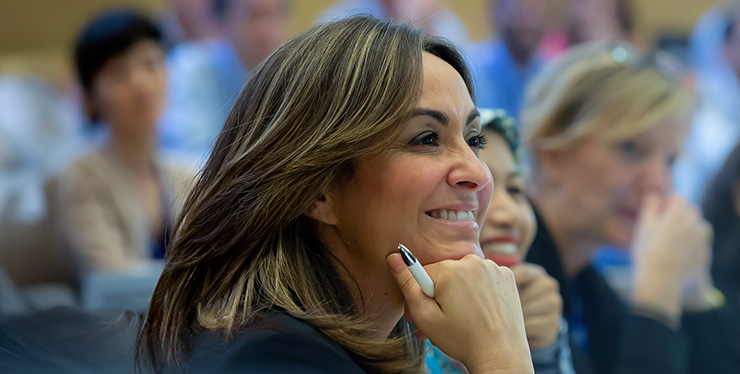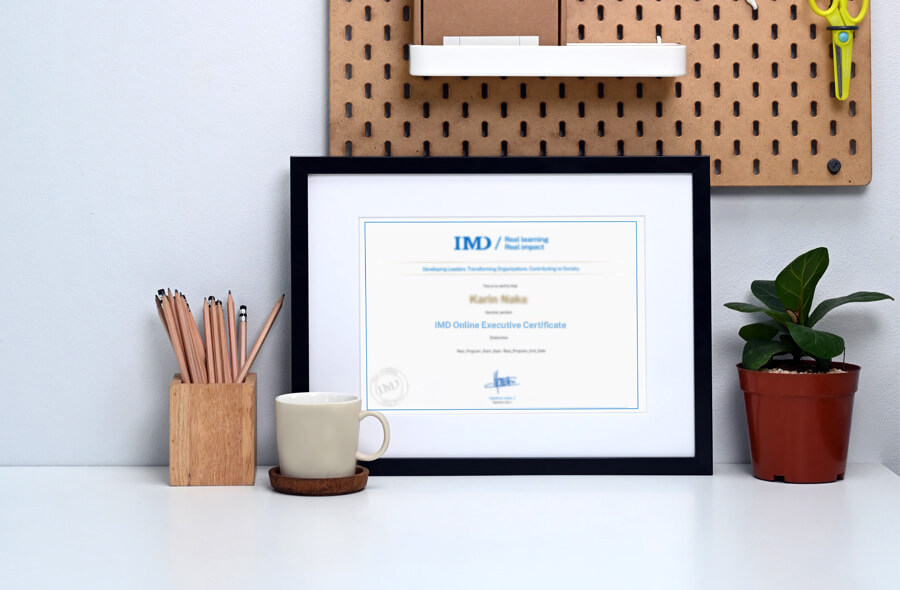IMD business school for management and leadership courses
Cracking the leadership code through focused development
“What I learned on my pathway to IMD’s Online Executive Certificate in Leadership is significantly contributing to my professional and personal life. Communication was the common thread running through all four of my programs, which each offered a unique perspective and addressed different challenges. I now have all the necessary tools to communicate efficiently with my key stakeholders, and I can better help the amazing engineers I work with.”
Thomas Rouvinez is a Senior Software Engineer in the gaming division of Logitech, the Swiss multinational manufacturer of computer peripherals and software. He’s responsible for the stability of the gaming software, which involves monitoring production, identifying and resolving issues, and finding ways to simplify the architecture. He leads a squad of four developers and collaborates with multiple stakeholders across the organization.
Aware that he needed to develop his leadership skills, Thomas initially looked into MBA programs, but quickly realized he wanted a customizable learning journey to address his specific needs. When he discovered IMD’s online leadership programs, their modular approach, cost, and compatibility with his full-time job convinced him that they were the best solution. After a discussion with a program advisor, he signed up for IMD’s eight-week Inspirational Leadership.
Debugging communication skills
Inspirational Leadership focuses on developing core leadership capabilities, including self-awareness, negotiation, coaching techniques, and conflict resolution. It encourages participants to reflect on their leadership style and engage more meaningfully with others.
Thomas admitted that before the program, his communication skills were rather “rough around the edges”.
“Engineers are often a little direct in terms of communication,” he said wryly. “Things work or they don’t. It’s binary – there’s no in between. The gray area is just problems and bugs. We tend to go into meetings with people who aren’t engineers saying ‘No, it’s like this’ and we don’t change our minds – it’s very off-putting.”
Inspirational Leadership not only enhanced his communication skills but also made him realize that in conflict situations, he often became a kind of hostage – aligning completely with one person, only to switch perspectives after speaking with the other. This prevented any progress and left issues unresolved. Understanding this has enabled him to change his approach and defuse conflict more skillfully.
“Everything I learned is applicable outside of work too,” he pointed out. “Conflicts happen at home, with friends – everywhere – and everything has to be negotiated.”
His positive experience motivated him to enroll in a second online program: Crisis Management.
Building crisis resilience through strategic planning and communication
IMD’s Crisis Management program, which is grounded in disruption response theory and psychology, begins by exploring how to prepare for the unknown, encouraging participants to identify strategies and models for building organizational resilience.
The program instilled in Thomas the notion that “it’s all in the planning”. The various models and templates he learned have proved useful for project scoping and analyzing processes. He’s also equipped to have more effective conversations with multiple stakeholders in turbulent times.
“Knowing how to communicate with stakeholders changes the way you manage crises a lot,” he said, reflecting that what he learned in the program was “a specialized extension” of the communication skills he had honed in Inspirational Leadership.
Supporting behavioral change
When Thomas was asked to coach two colleagues who were struggling, he realized he urgently needed practical techniques and ideas to be able to support them efficiently. He returned to IMD’s website in search of a suitable program and found Changing Employee Behavior.
The program provides participants with proven tools and techniques drawn from research in the fields of behavioral economics, cognitive and behaviorial psychology, and systemic psychotherapy.
Although Thomas was already coaching his colleagues when the program started, he was able to test the new tools he learned and see their impact. One of these was the MAPS model, which leverages motivation, abilities, psychological capital, and social environment to change employee behavior.
“It’s a great lens to look at a situation, especially on an individual level,” he said, adding that he not only uses the model for coaching purposes, but also for sprint planning and delegating tasks.
With three leadership programs under his belt, Thomas learned that if he completed a fourth online program and a final assessment, he could earn an IMD Online Executive Certificate in Leadership, an internationally recognized Certificate of Advanced Studies. He had already envisaged signing up for the Change Management program, for a very specific reason.
Bringing a vision for change to life
Part of Thomas’ job involves giving developers feedback on what goes wrong in production, how it was fixed, and suggesting alternative methods.
“At this individual level, I would never be out of a job, but I didn’t want to have to repeat myself to every developer for the same mistakes,” he explained. “I wanted to be able to take those things to an organizational level and make them part of the culture.”
Throughout the Change Management program, which brings together leadership and strategy, participants apply their learnings to a change initiative they are involved in. For Thomas, this was ideal, as he was able to focus on certain processes within his company, shape his vision for change, and make it happen.
“There were a lot of parallels with the other three programs, and it was a good one to finish with because it consolidated everything,” he noted.
Closing the loop
Thomas had begun his certificate pathway by reviewing a 360-degree feedback report, compiled by IMD for the Inspirational Leadership program on the basis of input from his colleagues. A year and a half later, as part of his final assessment, he had to write about his key takeaways from each program and invite some of his stakeholders to comment on the changes they had observed.
“This reevaluation was great confirmation of the difference the programs had made,” he said. “It closed the loop.”
The certificate pathway enabled him to progressively raise the level of his leadership and create a noticeable impact.
“The online format is really great,” he said. “When you think about online programs, you worry that you’re going to feel disconnected, but the interaction with the coaches, learning buddies, and groups makes it real.”
Thomas emphasized that potential participants should speak with an IMD program advisor to ensure the learning journeys they are considering are related to issues they are exposed to and will be truly beneficial.
“I ended up with four programs that combined really well and were connected with what I do at work,” he reflected. On a personal level, he’s grown too.
“I’ve stopped overthinking and making assumptions,” he explained. “Before the programs, I would assume things and end up drifting far away from the truth, fighting my own fight in a kind of virtual reality that served no purpose. Now I ask questions.”



Interested in an IMD online program but not sure where to start? Our program advisors would be happy to help.
Questions? Let’s talk.
Interested in an IMD online program but not sure where to start? Our program advisors would be happy to help.

